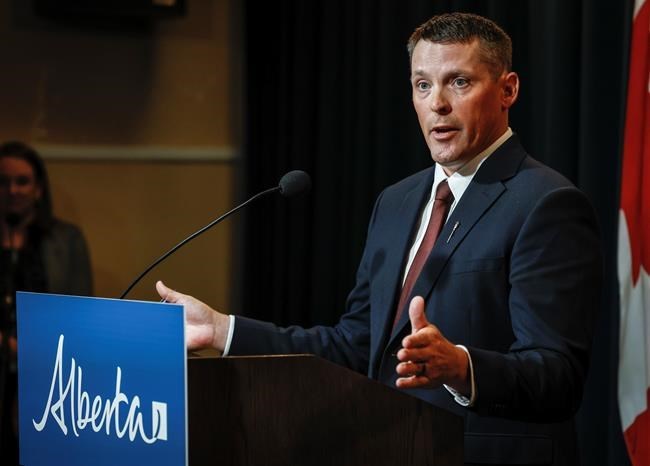
Finance Minister Nate Horner — after promising any stand-alone Alberta pension plan would not follow the contentious Quebec model, then saying it might, then saying it won't — told reporters Friday that possibility is back on the table. Horner speaks to the media at a news conference in Calgary on Thursday, June 29, 2023. THE CANADIAN PRESS/Jeff McIntosh
December 08, 2023 - 1:22 PM
EDMONTON - Finance Minister Nate Horner — after promising any stand-alone Alberta pension plan would not follow the contentious Quebec model, then saying it might, then saying it won't — told reporters Friday that possibility is back on the table.
Horner rejected suggestions he was sending mixed messages, but the Opposition NDP called it another example of how the United Conservative government is crafting key policies on the back of a napkin as it examines having Alberta leave the Canada Pension Plan.
“I have never flip-flopped on this issue,” Horner told reporters at the legislature as he and Jim Dinning, the chair of the province’s pension engagement panel, delivered an update on the public consultation process.
“If Albertans were to come back … and say this (the Quebec model) is exactly what they want, they would have to have that conversation with the government of the day.”
Quebec runs its own pension system, with a dual mandate to maximize fund returns but also invest in the province.
Some Albertans have expressed concern to Dinning’s panel that, should Alberta adopt the Quebec model, pension benefits could be at risk through politically driven investment in dicey pet projects and sweetheart business deals.
Horner initially put those concerns to rest on Oct. 12, telling the Ryan Jespersen online show the Quebec model was out and that there would be legislation to confirm that.
"We don't believe in going down the model that Quebec has,'' Horner said at the time.
Horner told Jespersen that legislation would be introduced to cancel out using the Quebec model and spell out that "any (pension) assets used would only be used for a pension plan.''
Days later, Horner, through spokesperson Savannah Johannsen, said the Quebec model was back on the table and that it was up to Albertans to decide if they wanted to adopt it. Johannsen declined to explain why Horner’s policy had been reversed.
“(Dinning’s) engagement panel will hear whether Albertans want that mandate to be solely focused on maximizing returns or whether it should have a dual mandate that also focuses on economic development in Alberta, similar to Quebec's pension manager,” Johannsen said in a statement Oct. 16.
On Nov. 2, Horner introduced a bill, later passed, that mandates a referendum be held before Alberta could quit the CPP.
Section 7 of the bill stipulates that any money transferred over from the CPP must be used for the Alberta plan.
The bill does not stipulate that fund money accrued after an Alberta plan is up and running must stay in the plan — opening the door for that money to be spent on provincial projects similar to the Quebec program.
On Wednesday, the Opposition NDP put forward an amendment to the pension bill to effectively disqualify the Quebec plan by having the bill clarify that all future pension contributions must stay in an Alberta fund.
Horner and the United Conservative majority voted down that amendment.
Horner labelled it “redundant,” assuring the house that "future contributions of employers and employees would solely be used to set up and operate a provincial pension plan.”
Opposition NDP jobs, economy and trade critic Nathan Ip said Horner’s ongoing contradictions indicate the government is “kind of making it up as they go.”
He said his caucus had introduced the amendment to the pension bill precisely to ensure the Quebec model was out.
“With that (Quebec) model, recipients are paying more but getting less and that is not a road we want to go down,” he said.
Dinning’s panel has heard from Albertans in five telephone town hall sessions on whether there is sufficient public interest to pursue an Alberta-only plan.
Smith has said if there is enough interest, they would proceed to a referendum.
Dinning had promised in-person town hall sessions in December but told reporters Friday those sessions will now be put off until Canada’s chief actuary gives its estimate of how much Alberta should receive from the CPP if it splits off.
Dinning said they heard from 142 callers and logged 3,800 comments and questions in the town halls to date, with about half the respondents urging Alberta leave the CPP alone and a quarter in favour of Alberta setting up its own plan.
“It’s fair to say we heard from many Albertans who oppose the idea of exiting the Canada Pension Plan and moving to an Alberta plan, many of them quite passionate,” said Dinning.
“There is no doubt that this is a sensitive issue for a lot of people, but especially those who worry about a vital source of their retirement income.”
A report commissioned by Smith’s government estimates that with Alberta’s outsized contributions, factoring in compound interest, means it is owed more than half the fund, estimated at $334 billion by 2027.
Other economists and the Canada Pension Plan Investment Board have pegged Alberta’s share closer to 15 per cent, reflective of the number of Albertans in the plan.
The NDP continues to have in-person town halls and says hundreds have turned out to demand the province keep the CPP as-is.
This report by The Canadian Press was first published Dec. 8, 2023.
News from © The Canadian Press, 2023